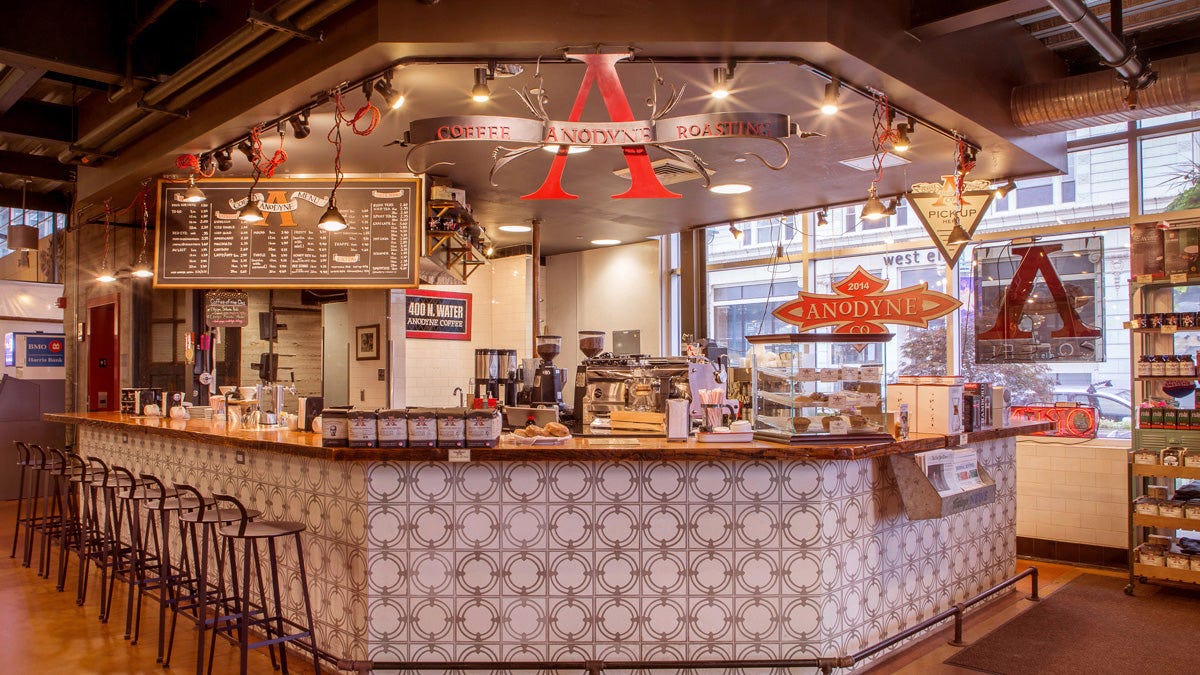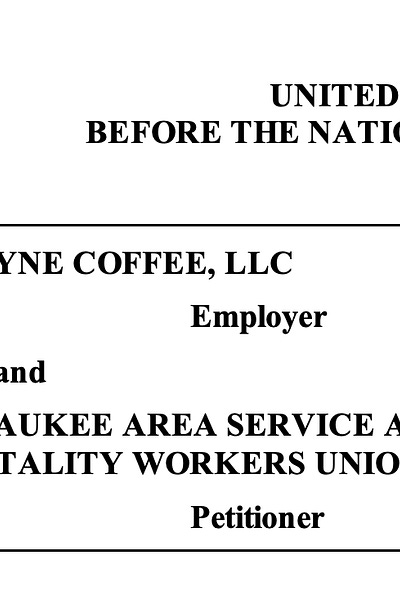Victory in Election Objections Case
Anodyne Coffee workers are much closer to union certification.
A little over a month ago, I represented the Milwaukee Area Service and Hospitality Workers Union (MASH) in their effort to certify a union covering Anodyne Coffee’s five stores in Milwaukee. The union had collected cards authorizing the union from every person in the bargaining unit and won an NLRB election by a margin of 37 to 0. Despite this overwhelming showing, Anodyne, which is part of a larger company called the FairWave Coffee Collective, filed objections seeking to have the election results set aside.
The objections were that (1) a union representative had intimidated a higher-up in FairWave management by watching her and following her in one of the Anodyne cafes and (2) that five individuals who had participated in the union campaign were actually supervisors and that their participation unduly coerced workers to support the union.
The first objection was completely false and baseless. At the hearing, the employer’s counsel did not mention it in opening or closing and did not present any evidence in favor of it. One of the employer’s own witnesses testified that she had been pressured to give an inaccurate assessment of the event in question.
The second objection was also insincere. As the Hearing Officer’s Report below details, even if the five individuals were supervisors, their pro-union conduct — consisting of things like wearing a union t-shirt and posting on Instagram — was not at all coercive and certainly did not swing the outcome of a 37-0 election. This was obvious to anyone who knows anything about this area of law.
It became clear pretty quickly that Anodyne brought these objections, not because it actually thought it would win them, but because it wanted a decision about whether these five individuals were supervisors. The proper way to get that decision is not through election objections but through a unit clarification petition. This was pointed out to Anodyne’s counsel multiple times, including by the NLRB, but she nonetheless decided to pursue the issue in the guise of election objections, maybe to waste time, maybe to save face. It’s hard to say.
Whatever the case, the five individuals that Anodyne claimed were supervisors were not actually supervisors. As the Hearing Officer’s Report finds, these five individuals did not have the ability to perform any of the twelve supervisory functions like hiring, discharging, and disciplining and, where they had some involvement in those functions, they did not exercise independent judgment.
This was a pretty straightforward case as far as these things go, but two things stood out to me that could be of interest to regular readers.
Less than two days before the hearing was set to begin, Anodyne issued a subpoena to the president of MASH seeking all communications between the five alleged supervisors and the union. I filed a petition to revoke this subpoena on the theory that it illegally sought information about union activity and that private communications between these five individuals and the union could not have coerced other individuals voting in the election because they did not see them. The Hearing Officer agreed and revoked the subpoena.
Anodyne’s argument that these five individuals were supervisors was largely based upon the fact that their job descriptions and evaluations appeared to say they did supervisory things. But these job descriptions and evaluations were not accurate. Under Board law (Golden Crest), such documents are dismissed as “mere paper” in the absence of other evidence that the alleged supervisors actually carry out the functions described in them, and that is what happened in our case. Nonetheless, the job descriptions created some uncomfortable moments in the hearing. The counsel for Anodyne, who was sitting next to an Anodyne boss, would show the job descriptions to the five alleged supervisors and then ask them if they understand those are their job duties and ask them whether they refuse to follow them. This is not really relevant: the question is not whether they’d refuse to do those functions if told to do them but rather whether their jobs actually involve those functions. But asking the question this way makes it so that honestly testifying about one’s job duties sounds like open insubordination. At one point, I objected to this line of questioning as threatening, which was sustained. The workers also handled it well despite the discomfort caused by this kind of gamesmanship from their employer.
Below is the Hearing Officer’s Report and a summary.
In this case, the National Labor Relations Board (NLRB) Region 18 considered objections filed by Anodyne Coffee, LLC following a union election where employees voted unanimously (37-0) in favor of representation by the Milwaukee Area Service and Hospitality Workers Union.
Anodyne Coffee filed two objections to the election results. First, they claimed that five individuals (Luz Acosta, Devi Arnold, Samuel Meyer, Tash Prather, and Danielle Williams) were statutory supervisors who engaged in pro-union conduct that interfered with the election. Second, they alleged that a union representative attempted to intimidate a manager.
The central legal issue was whether these five individuals were "supervisors" under Section 2(11) of the National Labor Relations Act. The Hearing Officer conducted a detailed analysis of their duties and responsibilities, examining primary indicia of supervisory status (such as authority to hire, fire, discipline, assign work) and secondary indicia (such as job titles, attending management meetings).
The Hearing Officer concluded that Anodyne failed to establish by a preponderance of evidence that any of the five individuals were statutory supervisors. The evidence presented was largely speculative, uncorroborated, or conclusory. None of the individuals had direct reports, and they lacked independent authority to make significant employment decisions.
Even assuming they were supervisors, the Hearing Officer found their pro-union conduct (wearing union buttons, attending meetings, posting on social media) would not have been objectionable under the Harborside test. The conduct did not reasonably tend to coerce employees, nor did it materially affect the election outcome.
For the second objection regarding alleged intimidation, Anodyne presented insufficient evidence to support their claim.
The Hearing Officer recommended overruling both objections and certifying the Union as the exclusive bargaining representative for the appropriate unit of employees.
Significant Cases Cited
Harborside Healthcare, Inc., 343 NLRB 906 (2004): Established the two-part test for determining whether a supervisor's pro-union conduct is objectionable.
Oakwood Healthcare, Inc., 348 NLRB 686 (2006): Provided interpretation of "independent judgment" and defined "responsibly to direct" for determining supervisory status.
Golden Crest Healthcare Center, 348 NLRB 727 (2006): Held that job titles and descriptions are not given controlling weight and must be supported by evidence of actual authority.
Northeast Iowa Telephone Co., 346 NLRB 465 (2006): Found no coercion despite managers attending union meetings and participating in union activities.
NLRB v. Kentucky River Community Care, Inc., 532 U.S. 706 (2001): Established the three-part test for determining supervisory status under Section 2(11) of the Act.


